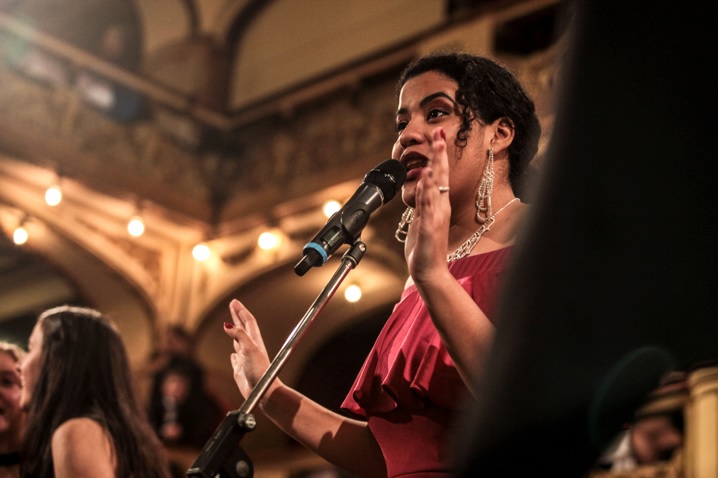
By Carol Barron
Singing is one of our most ancient urges. It connects us to our tribal past and fills us with happiness.
When we sing, our whole body is the instrument. Our ribcage vibrates, our airways hum, musical vibrations move through our body and alters our physical and emotional landscape and a light goes on behind our eyes.
Singing increases your lung capacity as well as promoting better posture. When we sing, we become more mentally alert. We breathe more deeply and draw more oxygen into the blood, causing better circulation.
It gives your immune system a boost. Singing releases stored muscle tension and decreases the levels of stress hormone cortisol in the blood. This explains why you can sing a depressing Leonard Cohen song and it will still make you happy!
Singing in public is at best seen as the preserve of the busker, at worst that of the intoxicated, the annoying and the downright doolally. This is one of the reasons why churches are so important.
The comedian, Bill Bailey, says he is not especially religious, but he loves standing in church singing hymns with others and says that it is one of life’s greatest pleasures. He belts them out joyfully, trying to harmonise where possible.
Our innate desire to sing has been ruthlessly co-opted and monetized by an endless succession of TV talent shows. But this should not deter us from making this righteous sound.
Singing boosts our endocrine system and it’s good for our heart. There is even research that claims that choral singing can make you live longer.
Group singing is the most transformative of all. It soothes your nerves and elevates your spirit. The elation comes from endorphins or oxytocin which are both hormones released when you sing, and are associated with feelings of pleasure and alleviating anxiety and stress.
Oxytocin also enhances feelings of trust and bonding, which explains why studies have found that singing reduces feelings of depression and loneliness and contributes to a higher quality of life.
Group singing is cheaper than therapy, healthier than drinking, and certainly more fun than working out. It is the one thing in life where feeling better is pretty much guaranteed. Even if you walked into rehearsal exhausted and depressed, by the end of the night you’ll walk out high as a kite on endorphins and good will.
It turns out you don’t even have to be a good singer to reap the rewards. According to one 2005 study, group singing “can produce satisfying and therapeutic sensations even when the sound produced by the vocal instrument is of mediocre quality.” So perhaps you may like to join the choir?
Singing is distinctively Methodist. From the beginning, Methodists were famed for their hearty singing and today we are still known as “a singing people.”
Charles Wesley, one of the founders of Methodism, was also one of the most prolific hymn writers ever. His brother John included directions for singing in a collection of Methodist hymns and laid out seven principles.
I particularly like these two:
- Sing lustily – and with good courage. Beware of singing as if you were half-dead or half-asleep; but lift up your voice with strength.
- Sing modestly – do not bawl so as to be heard above or distinct from the rest of the congregation that you may not destroy the harmony, but strive to unite your voices together so as to make one melodious sound.
While certainly not all Methodists can sing (especially melodiusly) or even like singing, the denomination was and is a tuneful one as a whole.
Singing is also distinctly Kiwi – waiata are essential parts of a pōwhiri. As part of a comedy festival in this country, Bill Bailey attended a pōwhiri and after the hongi and the tangata whenua’s waiata, the manuhiri realized they needed to waiata.
Apparently, Bill started singing, “You are my sunshine,” and soon the rest of the comedians joined in. Bill says that it is one of the most surreal and wonderful moments he can recall. He says that it was goofy and awkward, and they were not the greatest singers, but there was something sweet and heartfelt about it. And that’s what its all about.
NEWS FLASH: The latest summary of the science confirms yet again that singing is good for you, and group singing is the most exhilarating and transformative of all: “The neuroscience of singing shows that when we sing our neurotransmitters connect in new and different ways. It fires up the right temporal lobe of our brain, releasing endorphins that make us smarter, healthier, happier, and more creative. When we sing with other people this effect is amplified… What has not been understood until recently is that singing in groups triggers the communal release of serotonin and oxytocin, the bonding hormone, and even synchronises our heart beats.”
Singing is instinctual, even necessary to our existence. Society has skewed our views and made singing something reserved for elite talent and highly produced stars. However you don’t have to be an amazing singer to benefit from its basic biological and, some might say, spiritual benefits, if you just raise your voice and let yourself go. Sing like no-one is listening! (Ed.)

This is such good information- perhaps world leaders should try this to settle their differences!
I am starting a community sing-a-long this month and know that all those who attend will reap the benefits and have some fun.